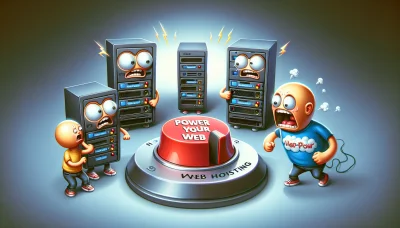Namecheap abuse Quiz
Test Your Knowledge
Question of
Understanding Namecheap Abuse in Web Hosting
Namecheap abuse in the context of web hosting refers to the misuse of Namecheap's hosting services by individuals or entities. This can include hosting illegal content, launching phishing attacks, spamming, or any activities that violate Namecheap's terms of service. As a web hosting provider, Namecheap has policies in place to combat abuse and ensure a safe environment for all users. When abuse is detected, Namecheap takes appropriate actions, which can include suspending or terminating the offending accounts to maintain the integrity and reliability of their hosting services.
Common Types of Namecheap Abuse
- Phishing - Hosting sites that impersonate legitimate businesses to steal personal information.
- Spamming - Using the hosting service to send unsolicited bulk emails.
- Distribution of malware - Hosting sites that distribute harmful software.
- Infringement of intellectual property - Hosting content that violates copyright or trademark laws.
- Illegal content - Hosting content that is illegal, such as child exploitation material or content promoting hate speech.
- DDoS attacks - Using servers to conduct Distributed Denial of Service attacks against other sites.
How to Identify Namecheap Abuse
Identifying Namecheap abuse, particularly in the context of web hosting, involves recognizing unauthorized or malicious activities on your account or associated services. Users might notice unusual traffic spikes, unauthorized domain transfers, phishing attempts, or the hosting of illegal content under their account. It's crucial to regularly monitor account activity, review security notifications from Namecheap, and ensure that your contact information is up-to-date for receiving timely alerts. If you suspect any form of abuse, it's imperative to contact Namecheap's support team immediately for assistance and to secure your account.
Preventive Measures Against Namecheap Abuse
To protect yourself from Namecheap abuse, especially in the context of web hosting, it's crucial to implement a few preventive measures. First, always ensure your account credentials are strong and secure; use a combination of letters, numbers, and special characters for passwords, and consider using a password manager. Enable two-factor authentication (2FA) for an added layer of security. Regularly monitor your account for any unauthorized access or suspicious activities. Additionally, keep your domain registration details private using Namecheap's domain privacy feature to prevent personal information exposure. Be cautious of phishing attempts by verifying the authenticity of emails claiming to be from Namecheap. Lastly, familiarize yourself with Namecheap's abuse policy and report any abuse or suspicious activities immediately to their support team for prompt action.
How to Report Namecheap Abuse
To report abuse related to web hosting or any other services provided by Namecheap, you should first gather all relevant information that supports your claim. This includes URLs, screenshots, emails, or any other evidence that can substantiate the abuse. Once you have this information, visit the Namecheap official website and navigate to the "Support" section. Here, you will find an "Abuse Reports" option. Click on it to access the abuse report form. Fill in the form with as much detail as possible, attach any supporting documents, and submit it. Namecheap takes abuse reports seriously and will investigate the matter to take appropriate action.
Namecheap's Response to Abuse Reports
Namecheap takes abuse reports very seriously, especially when it comes to their web hosting services. Upon receiving an abuse report, the company initiates a thorough investigation to verify the claim. This involves examining the nature of the abuse, which could range from spamming, phishing, hosting malicious content, to other forms of misuse of their web hosting services. Namecheap's dedicated abuse team works promptly to address and mitigate any verified issues, ensuring compliance with their policies and maintaining a safe and secure environment for all users. The company also communicates with the reporting party to keep them informed of the investigation's progress and the actions taken. Namecheap's proactive and responsive approach underscores their commitment to upholding high standards of internet safety and customer satisfaction.
Case Studies of Namecheap Abuse
| Nature of Abuse | How It Was Identified | Actions Taken |
|---|---|---|
| Phishing Websites | Automated security scans detected suspicious URLs mimicking well-known brands. | Websites were taken down, and the account holders were banned. |
| Spam Email Campaigns | Reports from users and increased activity in server logs. | Email sending capabilities were disabled, and the offenders' accounts were suspended. |
| Distribution of Malware | Third-party security services flagged hosted files as malicious. | Infected files were removed, and websites were temporarily suspended for investigation. |
| Illegal Content Hosting | Law enforcement notifications and internal content review processes. | Content was removed immediately, and relevant authorities were informed. |
Conclusion: Safeguarding Against Namecheap Abuse
The significance of recognizing and defending against Namecheap abuse in the realm of web hosting cannot be overstated. As an essential player in the hosting industry, Namecheap's platform can sometimes be exploited for malicious purposes, affecting not just individual website owners but also the broader internet community. Understanding the potential abuses—ranging from phishing scams to hosting harmful content—and implementing robust security measures is crucial. By doing so, users can ensure their online presence is secure, reliable, and contributes positively to the digital world.











